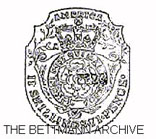To pay for some of the costs of the French and Indian War, in March of 1765, Lord George Grenville asked the English Parliament to impose the Stamp Act. This was the first direct tax on the American colonies. All printed materials were taxed, including; newspapers, pamphlets, bills, legal documents, licenses, almanacs, dice and playing cards. The law would go into effect November 1, 1765.
Britain thought they would collect 60,000 pounds a year from this tax. Even though each stamp would only cost from 1/2 penny to 10 pounds, the colonists were afraid that England would not stop at just this tax.
The colonists were infuriated over this decision by King George III. The colonists felt they should be taxed only by their own government, they didn't like the British troops in their land, and they didn't like that the tax had to be paid in silver.
In May, Patrick Henry presents seven resolutions to the House of Burgesses that basically say only the Virginia assembly can legally tax Virginia residents. He is quoted as saying, "If this be treason, make the most of it."
In July, the first group of Sons of Liberty is formed in a number of colonial towns. It is an underground organization of people who oppose the Stamp Act. The members decided to use violence and intimidation to fight against the Stamp Act. The Sons of Liberty burned the stamps. They threatened the stamp agents. Most stamp agents were scared of the Sons of Liberty. Samuel Adams lead the group in Boston. He attacked the Act in the city's newspapers. One time they hung a puppet that looked like the stamp agent to a tree. That tree is known as the Liberty Tree.
On August 26, a mob in Boston attacks the home of Thomas Hutchinson, Chief Justice of Massachusetts, as Hutchinson and his family narrowly escape.
On October 7, 1765, representatives from nine colonies attend the Stamp Act Congress in New York City. This Congress passes a resolution to be sent to King George III and the English Parliament. The petition requests the repeal of the Stamp Act and the Acts of 1764. The petition stated only colonial legislatures could tax residents of the colonies and taxation without representation violates their basic civil rights.
On November 1, 1765, almost all daily business and transactions in the colonies came to a stop when the Stamp Act went into effect because the colonists refused to use the stamps. In New York City, a mob made a stuffed image of its royal governor, burned it, harassed the British troops, and then looted homes.





